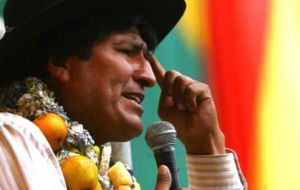MercoPress. South Atlantic News Agency
Bolivia votes ‘native justice’; four policemen lynched by indigenous mobs
 Evo Morales, Bolivia’s first indigenous elected president
Evo Morales, Bolivia’s first indigenous elected president The Bolivian Lower House dominated by President Evo Morales party approved this week the Judiciary Bill which contemplates “native or indigenous justice” which has been strongly criticized since it opened the door to the lynching of policemen in two different incidents.
The bill was approved by the ruling majority in the Lower House, almost with no debate since the opposition walked out because a majority of their proposals were finally not incorporated into the text.
Lawmaker Cecilia Ayllon, from the ruling party and chairwoman of the Plural Justice Committee said that the main change introduced to the original bill was the inclusion of two basic principles of the ‘community justice’, respect for human rights and for life.
Ayllon admitted however that ‘native justice’ already enshrined in the 2009 Constitution sponsored by President Evo Morales “is being wrongly interpreted and used for political purposes” such was the case of the public lynching in Potosí of several policemen by ‘ayllus guerreros’ (indigenous clans).
Congress still has to work on a bill that circumscribes ‘ordinary justice’ and ‘native justice’. The interpretation bill for which congress has 180 days should help with ‘different jurisdictional problems surfacing plus ensuring the necessary harmony that must exist between both systems’.
Lawmaker Elizabeth Reyes said she was most disappointed the first fundamental bill was approved with virtually no debate since the it does not establish how far the “native justice” will apply: for minor crimes such as land disputes or major crimes such as homicide, drugs trading, contraband which are prevalent in the district the four policemen were lynched.
The opposition also criticized the fact that those aspiring to become members of the native justice Supreme Tribunal will be nominated according to their tribes and ignoring professional merits, based on privileges contemplated in the new constitution.
From the Lower House the bill now goes to the Senate where Morales has a comfortable two thirds majority.
Meanwhile it was reported in La Paz press that a Bolivian Indian community once again applied the principle of “native justice” by killing an accused murderer in the southwestern province of Potosi, where two weeks ago four policemen met the same fate.
The lynching was carried out on Tuesday in the community of Juruma, where the Indians lynched Santiago Flores, 51, after accusing him of two murders, two sexual assaults and various robberies, according to the daily La Prensa.
Flores was lynched some 300 kilometres from the Potosi village of Uncia, where the four policemen were tortured and murdered by another group of irate indigenous townspeople.
The provincial police chief, Col. Orlando Avila, said that the Indians took Flores from his home, whipped and beat him to death in front of a school and afterwards buried him in the Juruma cemetery. Police could not recover the body because some 400 people who were on the scene prevented them from approaching the gravesite.
Community leaders in Uncia turned over the bodies of the four lynched police officers last week, but only after the cops’ loved ones signed a pledge not to seek criminal charges against the killers.
Even so, this week the families decided to initiate legal action against the Indian communities and said they were considering filing charges against government officials and police commanders for dereliction of duty.
The first lynching occurred May 23 to May 25 and the last on June 1 or 2, when the government had already given all four men up for dead and was negotiating with the killers to recover the bodies.
The Indians of Uncia say lynching is part of the indigenous justice system that was recognized in the constitution enacted last year at the urging of President Evo Morales, but the government rejects that argument.
Officials say the recognition of traditional justice is not a license for vigilantism. The government also points to Bolivia’s constitutional ban on capital punishment.




Top Comments
Disclaimer & comment rules-

-

Read all commentsAn idiotic approach to lawmaking.
Jun 10th, 2010 - 08:40 am 0Two possibilities. The Indians (indigenous) are getting ready to throw of Spanish-descended domination or globally-recognised standards and procedures of law and justice must prevail.
Jun 10th, 2010 - 03:22 pm 0Commenting for this story is now closed.
If you have a Facebook account, become a fan and comment on our Facebook Page!